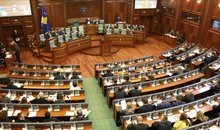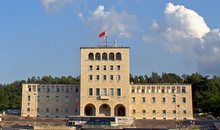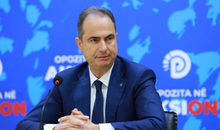
 Flash News
Flash News
Theth action, resident in tears: I built on my land with my life's expenses, the state should not destroy it
Directors targeted! After Fier and Durrës, Rama arrives in Elbasan
Name/Identification of the 23-year-old found dead near Shkopet Lake
IKM action in Theth, residents come out in protest
Reported missing by his father, 23-year-old found dead near Shkopet lake
VOA: 10 years after territorial administrative reform. there are still conflicting assessments of the results

In Albania, even today, ten years after the territorial administrative reform, contradictory assessments of its results still continue.
Officials claimed at a meeting that the reform of local government is a success story, but independent researchers point out that this reform did not achieve the main goals, administration and expenses increased further, while services to the community became difficult.
During a meeting with international donors to evaluate the ten-year reform of local government, the Minister of State for Local Government, Arbjan Mazniku, emphasized that the administrative reform was an extraordinary job successfully carried out with the merger of dozens of local units in 61 municipalities and the management of integrated community life into larger units.
"The administrative reform of 2014 was one of the most state-shaping reforms, not just in relation to the local government, but in relation to the whole way the Albanian state functions, how we have the opportunity as a community of people, to offer essential services to citizens ours. Its conception was a very complex exercise", said Mr. Mazniku.
But independent researchers are critical of how the administrative reform was carried out, its initial goals and its final results. Expert Agron Haxhimihali, the head of the Institute of Municipalities of Albania, Agron Haxhimihali, who studies the functioning of local government, tells the Voice of America that the reform did not fulfill the goals for which it was launched, because there were many disparities in services between urban areas and rural areas, as well as community representation in local government, municipalities were enlarged but have no sustainable development, while public services leave much to be desired.
"Citizens are not comfortable with this territorial and administrative reform. The main indicator for this is the fact that many citizens, mainly from rural areas, even in 59 other municipalities of Albania, excluding Tirana and Durrës, citizens are abandoning rural areas and citizens, because they do not receive services in quantity and quality", says Mr. Haxhimihali.
The reform of the local government, according to Minister Mazniku, has been a difficult and daily work, which made 61 municipalities function in a stable and systematic way, thanks to the digitization of services.
He added that the municipalities need more attention, investments, laws and further reforms, as basic mechanisms of coexistence in the community, because the challenges are increasingly greater in adapting the country to European integration standards.
"I believe that very healthy foundations have been laid, which, in addition to the large and important elements that were made during this project in time, are also inherent elements of what could be the seeds of a continuation of a series of other reforms important that the local government needs the way our municipalities function", said Mr. Mazniku.
But on the other hand, Mr. Haxhimihali emphasizes for the Voice of America that the efficiency of the local government has faded after the merger of dozens of local units in 61 municipalities, the powers of the local government have decreased in terms of territorial planning for development, agriculture and tourism, while the central government in addition to the concentration of powers, it has also covered the debts of the municipalities.
He added that only 23 percent of local government funds go to investments, most of them go to salaries and administrative expenses, while the promised cuts in expenses and administration were not carried out, instead the number of employees increased significantly.
"I'm just giving you one fact: Before the territorial reform, we had 373 local government units, which really were a lot of reform that needed to be done. These institutions had about 20-21 thousand employees. While today, after the reform, we have 61 municipalities, which have 37 thousand employees, who are paid by Albanian taxpayers", says Mr. Haxhimihali.
Local government reform was supported over a decade by a series of international donors, USAID, EU and UNDP, Sweden, Switzerland, Italy, an effort to revitalize Albania's administrative and territorial structures, through the STAR project, which supported the reform, for an efficient local government with integrity, to better serve the citizens.
The project also aimed at strengthening local government transparency and accountability, participatory practices, local governance and decentralization policy-making. VOA
Latest news



Hoxha: We will have a parliament that will surpass any comedy program!
2025-07-09 10:10:32

Directors targeted! After Fier and Durrës, Rama arrives in Elbasan
2025-07-09 09:53:57
Name/Identification of the 23-year-old found dead near Shkopet Lake
2025-07-09 09:42:34
IKM action in Theth, residents come out in protest
2025-07-09 09:34:54
Reasons why the EU has not imposed new sanctions against Russia
2025-07-09 09:18:35
DW: Online scams increase human trafficking
2025-07-09 09:01:29

Reported missing by his father, 23-year-old found dead near Shkopet lake
2025-07-09 08:42:13

Horoscope, what do the stars have in store for you today?
2025-07-09 08:25:44
Sun and rain, Wednesday with unstable weather
2025-07-09 08:06:58
Posta e mëngjesit/ Me 2 rreshta: Çfarë pati rëndësi dje në Shqipëri
2025-07-09 07:52:02

Tabaku: Salianji bore a political cost that no one in Albania has borne
2025-07-08 22:36:15


Sekretet për të shijuar verën si një ‘profesionist’
2025-07-08 21:45:06


Albania's Waste Crisis: Toxic Smoke and Deep Governance Problems
2025-07-08 21:13:07
Alarming pollution in Fushë-Arrëz, copper factory waste turns the Fan River red
2025-07-08 21:07:14

Poll/ How do you assess the Prime Minister's intervention in local government?
2025-07-08 20:40:01
28 arrested in Italy and Spain for drug trafficking, including an Albanian
2025-07-08 20:24:14
Residents clash with police in Theth: We are on our land
2025-07-08 20:11:41
Death of 27-year-old in Lipjan, Osmani: To be investigated independently!
2025-07-08 20:06:52
Trump promises US will send more weapons to Ukraine
2025-07-08 19:54:25

EU targets health, education, police and cadastre as areas of corruption
2025-07-08 19:23:34




Salianji after his return: I did not oppose for functions, but for vocation
2025-07-08 18:23:15
Will he run in the 2029 elections? Here's how Salianji answers
2025-07-08 18:16:09
Boat captain drowns after diving into water to save two tourists in Shkodra
2025-07-08 18:05:12
Salianji from the DP headquarters: I brought a drug trafficker to justice
2025-07-08 18:03:26
After Fier, Rama "landes" in Durrës, dismissals expected
2025-07-08 17:53:32
Ervin Salianji arrives at the blue headquarters, welcomed by supporters
2025-07-08 17:45:12

EU approves final steps for Bulgaria's Eurozone membership
2025-07-08 17:43:06

Zhupa after Salianj's release: Inspiration for every opposition member
2025-07-08 17:19:39
Actor David Killick passes away
2025-07-08 17:09:23



Threatened with dismissals, Rama arrives at the Fier municipality
2025-07-08 16:39:19
Extreme temperatures temporarily close Acropolis in Greece
2025-07-08 16:30:34

A plot of cannabis is discovered in Mazha, Kruja
2025-07-08 16:13:48

Republika Srpska allocates additional 22 million euros for lobbying in the US
2025-07-08 15:52:04

Spices that protect you from mosquitoes!
2025-07-08 15:30:03

Accident on the Vlora-Qeparo axis, one injured
2025-07-08 15:11:52
Berat, 17 years part of UNESCO's world heritage
2025-07-08 15:03:30


Cost of living increases, inflation rises to 2.4% in June, driven by food
2025-07-08 14:29:54
VIDEO/ Restaurant roof collapses in Italy, one victim and ten injured
2025-07-08 14:18:44
Requested release from cell, Supreme Court leaves Veliaj in prison
2025-07-08 14:07:41
TikTok shutdown/ Austrian media: Rama benefited politically from the app ban
2025-07-08 13:48:25
Acropolis temporarily closed due to heat
2025-07-08 13:31:09



Salianj's release/Berisha: He was politically condemned by Rama and Xhafa!
2025-07-08 13:00:13

Knife attack on Peshkopia Boulevard
2025-07-08 12:44:10


Fier Court decides on the conditional release of Ervin Salianj
2025-07-08 12:15:23
Cost of living increases, inflation rises to 2.4% in June due to food
2025-07-08 12:00:16


Requesting conditional release, Ervin Salianji arrives at the Fier Court
2025-07-08 11:16:36
The first phase of university applications begins today
2025-07-08 11:10:52
Fire in Lura, flames endanger the National Park
2025-07-08 10:53:43
Trump warns of 35% tariffs on Serbia and 30% on Bosnia and Herzegovina
2025-07-08 10:37:32
Thethi rooster and the dung cock
2025-07-08 10:24:01

Fire in Dukat endangers Llogara National Park
2025-07-08 10:01:39
International drug search: 36-year-old arrested in Durrës (NAME)
2025-07-08 09:50:48
Thethi, tourists "criticize" modern trend
2025-07-08 09:39:54
Fire on Mount Dukat still active, Llogara National Park at risk
2025-07-08 09:28:12
Veliaj's appeal to be heard today in the High Court
2025-07-08 09:16:02
"Bad sign for democracy"/ Parliament neglects reporting by institutions
2025-07-08 09:04:56
Today's hearing at the Fier Court, Salianji requests conditional release
2025-07-08 08:56:39


Horoscope, what do the stars have in store for you today?
2025-07-08 08:16:19
Weather forecast/ How temperatures will vary throughout the day
2025-07-08 08:02:37
Morning Post/ In 2 lines: What mattered yesterday in Albania
2025-07-08 07:48:30

